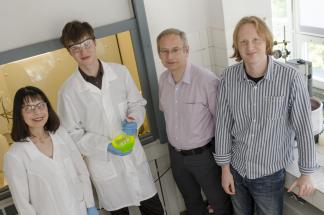Jul 21 2015
A team of researchers from the Organic Chemistry laboratories at Kaunas University of Technology (KTU) has created a material capable of being a cost-effective substitute to an already existing material used in hybrid solar cells.
 Vytautas Getautis with the team of KTU Chemists
Vytautas Getautis with the team of KTU Chemists
The new semiconductor material’s efficiency was verified at Swiss Federal Institute of Technology Lausanne. The research paper was chosen among 5% most important papers in Angewandte Chemie International Edition, a renowned chemistry journal globally (IF 11.261). The paper written by Kaunas and Lausanne researchers was rated as a very important paper (VIP).
“The material created by us is considerably cheaper and the process of its synthesis is less complicated than that of the currently used analogue material. Also, both materials have very similar efficiency of converting solar energy into electricity. That means that our semiconductors have similar characteristics to the known alternatives, but are much cheaper”, says professor Vytautas Getautis, head of the chemistry research group responsible for the discovery.
The tests conducted by the physicists at Lausanne on the solar cells containing organic semiconductors revealed that the cells’ exceptional effectiveness in converting solar energy into electricity was 16.9%. Very few organic semiconductors can achieve this high level of solar cell efficiency.
Prof Getautis states that the material formed by his team at KTU will be used in solar cell construction in the future. So far, only inorganic semiconductors have been used to fabricate most solar cells.
Several researchers are currently working on perfecting hybrid, semi-organic solar cells around the world.
The KTU invention has been registered at the European Patent Office by both the university and the Swiss Federal Institute of Technology Lausanne.
“Our paper is among the 5 percent of most important publications in one of the most influential chemistry journals followed by all undertaking research in the field of chemistry. This is great achievement for scientists from Lithuanian research institutions. In the future, the patent, which is registered together with the partners, will hopefully bring financial gain for the university”, says KTU senior chemistry researcher professor Getautis.